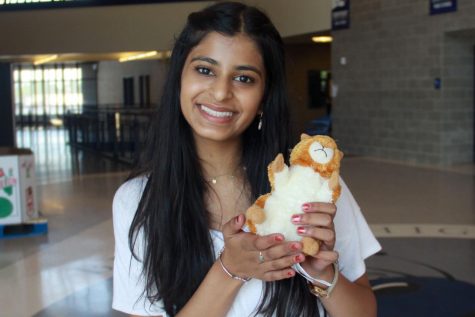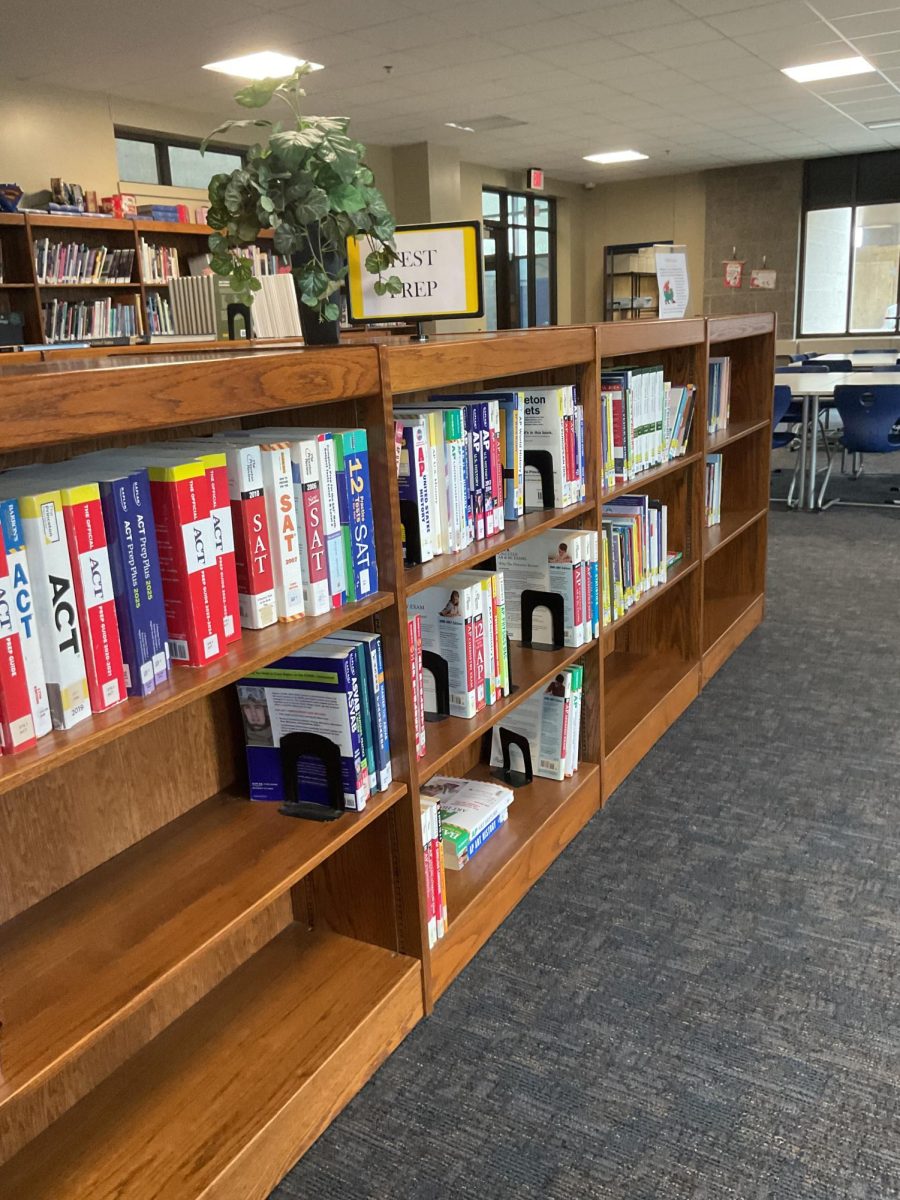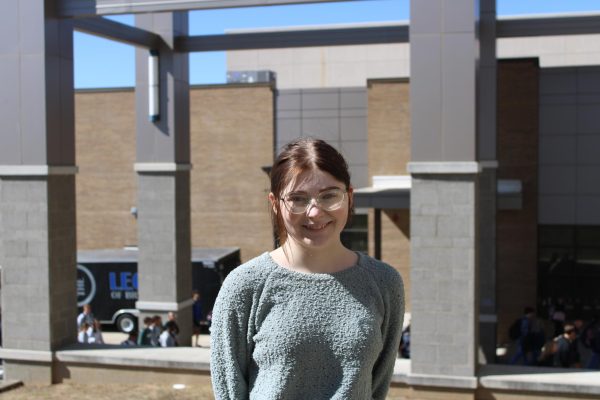Medical Mystery
Junior Madison Moore faces unsolved health issues
March 18, 2020
This story was written prior to the COVID-19 outbreak and was intended to be released in our March print issue.
Pitch black is all junior Madison Moore saw as she came tumbling down. What started as a normal summer cross country practice in 2018 quickly turned into an ongoing nightmare. As she was running her usual route with her usual teammates, Moore suddenly passed out, and what happened that day was only the beginning of her unsolved mystery.
Since that summer, Moore has been dealing with various symptoms, such as passing out while running, migraines, headaches and some chronic head pain. She has also experienced tremors where her hands shake rapidly. Moore now has fatigue and has experienced hair loss, losing all of her hair at one point. Doctors said the hair loss could be another symptom, or it could be due to the stress her body is under. When the hair loss was in its initial stage, Moore used headbands to cover it so that most people didn’t notice. As her symptoms progressed, her hair loss increased as well, causing chunks of hair to fall out in the shower.
“Once, it fell out almost completely,” Moore said. “It was hard to cover it up [as well as] deal with how people reacted. A girl being bald, especially in high school, people look at you differently and make assumptions about things. One person thought that I was going through chemotherapy, which I’m not. People look at you differently, which is something you can see, so it opens your eyes to who your real friends are. People are very judgmental, but the hardest part overall is how people’s perception changes.”
Despite the struggles she was going through, Moore’s good friend junior Madison Dettmer continued to recognize Moore’s positive attitude.
“I think Madison has become more confident in herself,” Dettmer said. “Her condition has caused some appearance changes that are out of her control, [but] I’ve seen her grow into whatever life throws at her.”
With her various symptoms came an abundance of doctors as Moore and her family tried to figure out what was happening to her body. She currently has 12 that she visits–some include a cardiologist, who she doesn’t visit as often anymore, a primary care provider, and a new neurologist, who has been trying a new treatment through botox.
“They are trying to insert the botox in my head for migraines, so they do 13 shots that go down to the skull, and once they get to the skull, they inject it,” Moore said. “It’s pretty painful. We will see if they work, because they just did those [recently]. This was my first time.”
Moore also has an allergy doctor for immunotherapy allergy shots. Doctors inject small increments of substances that trigger a reaction into the body weekly to strengthen the immune system to that foreign substance. The success rate of immunotherapy allergy shots is 70-85% in all cases.
“With all of this, they went ahead and did an environmental allergy test on the back to see if I was allergic to stuff in the environment, which could be contributing to some of the problems,” Moore said. “I was allergic to every single thing in Arkansas. Every tree, grass, weed, every single thing in the environment [of] Arkansas.”
To look into the reasons behind Moore’s fatigue, she also visits a doctor who analyzes her sleep patterns. She’s only seen this doctor once, but she plans to see him in April for a sleep study. The doctors will perform a sleep study at night and a nap test the next day, during which they will go through a series of different naps to study the sleep pattern.
“Since I have been more tired, I do sleep more often,” Moore said. “I sleep in before school or when I come home from school, I take a nap.”
After various doctors at Arkansas Children’s Hospital declared Moore’s diagnosis unsolvable, she is trying her luck at the Mayo Clinic in February. The Mayo Clinic is a non-profit American organization dedicated to solving the world’s toughest medical problems. When she visits them, Moore will gain a crew of new doctors to continue to try to resolve her questions.
“[The process has been] long and tiring,” Moore said. “It’s kind of stressful. In the beginning, there was a lot of hope that it was going to be easy, but then it just became more and more, and so there were more doctors and more tests. It’s been over a year now, so it has been a long time with no answers.”
In this long period, Moore has had to change her daily routine to accommodate her doctor’s orders and all of her appointments. Moore has missed a lot of school because of her new schedule. She does immunotherapy every Thursday and is usually at Children’s Hospital more than once a week.
“My grades are harder to keep up with, and my attendance has never been so low, which is super stressful,” Moore said. “I used to always be here, have all A’s and stay on top of things, but it’s school or health, and you have to put your health first. It’s also hard to schedule around school, because if certain doctors have openings, you have to take it before you lose the chance. I have to put in a lot more work, and some stuff, I have to just teach myself.”
The biggest change for Moore overall is not being able to run. Moore was a part of the cross country and track team before she was ordered by doctors not to run. It was not only one of her favorite hobbies, but something she shared with her twin sister junior Mackenzie Moore and Dettmer.
“Not being able to run [has been hard], because that was my hobby and outlet,” Moore said. “I would run with my best friend[s], and now I can’t, so that is hard. Really, I just hate not having answers. If they could tell me, ‘You don’t need to run, because you have this condition where you will pass out,’ it’s like okay, that makes sense. When they are just like, ‘Well, we don’t know, so just don’t [run],’ there’s still that unknown, and I don’t like the unknown.”
Madison Moore may have had to give up running, but she refused to give up her passion for horse riding. Madison was put in a dilemma to choose whether to continue riding or not when one doctor told her to quit and another said it was okay. She has been riding her whole life and began competing five years ago, so she continued despite the risks.
“[I continued because] I love it, and they already took away my other hobby, so I needed something to do that was fun and wasn’t medical or tiring,” Moore said. “I needed an outlet, just something to get away to go ride my horse and get away from that aspect of things. I needed something that didn’t revolve around passing out. Yes, I still have people watching to make sure I don’t pass out, but I forget about them, because I’m riding my horses.”
Another support that Madison relies on is Dettmer. Through this process, Madison says she has learned who her good friends are, and Dettmer is one of them. Dettmer remembers when Madison has appointments and send her texts wishing her luck.
“Madison is super supportive about it all,” Moore said. “There have been times where she is spending the night at my house, and we will be talking about it until three a.m. My friends have supported me by sticking by my side and just talking about it whenever I need to or not talking about it when I don’t want to.”
Dettmer says that the situation has brought the two closer together.
“Like any close friends, we confide in each other for support and encouragement,” Dettmer said. “Despite her situation, she’s always been there for me, and she inspires me and shows me what a true friend is every day. Madison and I are best friends. I’ve never thought of not supporting her. She has always been there for me and I couldn’t think of a better friend to have. I’d want someone to support me no matter what as well, so I will continue to support her as she has supported me.”
Along with the bond that Madison Moore has strengthened with Dettmer, her illness has also strengthened the bond she has with her mother, Becky Moore.
“My family has recognized that there is a problem, so my mom has been taking off work to go to doctors’ appointments with me,” Madison said. “I think [my mom and I] have gotten closer through this, because she is the one who has been driving me to appointments and being there through them and talking to the doctors for me. We talk about everything a lot more, and we have just become closer.”
Becky Moore isn’t the only family member sacrificing her time for Madison. Her twin sister Mackenzie has been taking on more responsibilities to make Madison’s life a little easier.
“Mackenzie hasn’t started unnecessary fights and has given me space,” Madison said. “She, if I have a doctor’s appointment or am running late, will take care of everything in the house by herself, no questions asked. She’ll jump in and take care of things to where I don’t have to worry about certain things. She’ll get my school work and stuff.”
Even with support, Madison still has days when it is hard to be positive. Her sister noticed that as her illness continued to be unsolvable, Madison became more defeated. The disappointment she felt from receiving answers right away was something her entire family shared.
“I think it has brought on a lot of stress, just between doctors’ appointments, as well as frustration because we want answers that we just aren’t getting,” Mackenzie said. “It’s been a lot of stress on us, but we’ve tried to keep our routine by continuing to do horses and any other activity that she can. Even though there aren’t any answers, it’s not a life-threatening problem as far as we know, so we just have to understand that it could be worse. She lost her hair, but it grew back. So we just need to recognize that it could be worse.”
Along this journey, Madison says she has learned a lot about how people see her. She’s learned a few medical terms because she is constantly at the hospital. She’s learned that some teachers are considerate, and some aren’t. Despite what seems like a never-ending process, Madison has learned above all to tackle her medical mystery with a positive attitude.
“Don’t lose hope and faith,” Madison says to anyone that is in her shoes. “Trust that God has a plan, and cast all your anxiety on Him. Stay strong, find an outlet, and don’t give up.”




